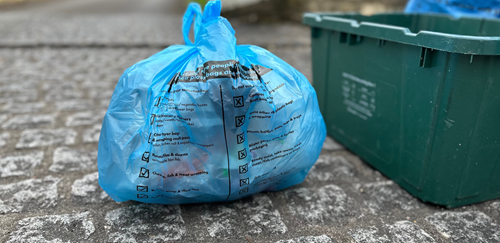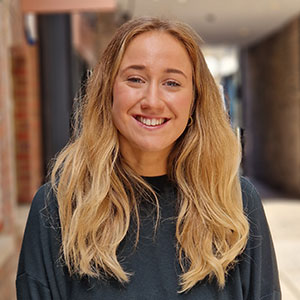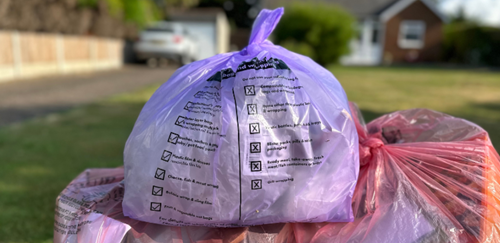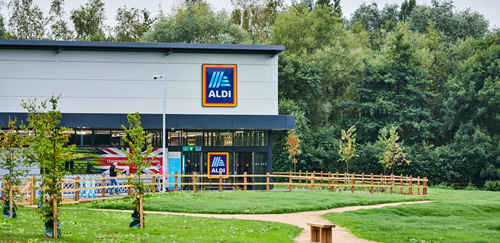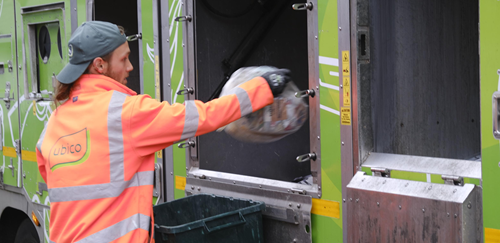The Flexible Plastic Fund (FPF) FlexCollect project has released an interim report showcasing the early insights from the seven local authorities currently running flexible plastic kerbside collection pilots, covering nearly 30,000 households from across the UK.
Authored by SUEZ recycling and recovery UK, this report provides encouraging insights at the project’s half-way stage. It will help local authorities, packaging producers, the plastic industry, policymakers and the waste and resource management industry, prepare for UK-wide collections in just over three years.
In March 2027, kerbside collection of flexible plastic packaging for recycling will be mandatory in England under revised EPR regulations and the Simpler Recycling reforms, and similar proposals have been made for the Devolved Administrations.
Discover some of the key findings from the report below.
Successful addition to existing collection services
Across all pilots, flexible plastic packaging collections have been added successfully into existing collection services. Whilst flexible plastic packaging is voluminous, the collection bags supplied to householders contain the material, keep it clean and withstand significant compaction. Furthermore, collection vehicles have enough capacity for the flexible plastic alongside the other recyclable materials they already collect.
Householders like the service and are using it
Householder surveys carried out in some of the pilot areas have found that the service is popular with householders. The average weight presented per collection bag per household across all pilots is 291g. Participation monitoring indicates 60% of households participate regularly and the data collected so far suggests participation is higher for weekly collections (64%) than fortnightly collections (47%). Levels of satisfaction amongst participating households exceed 89% and are as high as 96%.
Coloured bags are effective
The coloured collection bags supplied to householders have proved effective, promoting the collection of quality material and aiding separation of collected flexible plastics from other recyclable materials. Further data is required to determine how effective and efficient this system is on a larger scale.
Collected flexible plastic is very good quality
Based on data from five compositional analyses, the quality of materials collected is good – 90% is recyclable. Collected material is largely target flexible plastic packaging (82%) which is predominantly clean. Another 6% comprises the collection bags, 2% is non-target recyclables and the remaining 10% is non-target non-recyclable materials.
The detailed polymer composition of the 82% target material collected is:
69% mono polyethylene (PE) & polypropylene (PP) (45% and 24% respectively)
11% metalised packaging (crisp packets etc.)
2% all other flexibles including laminates
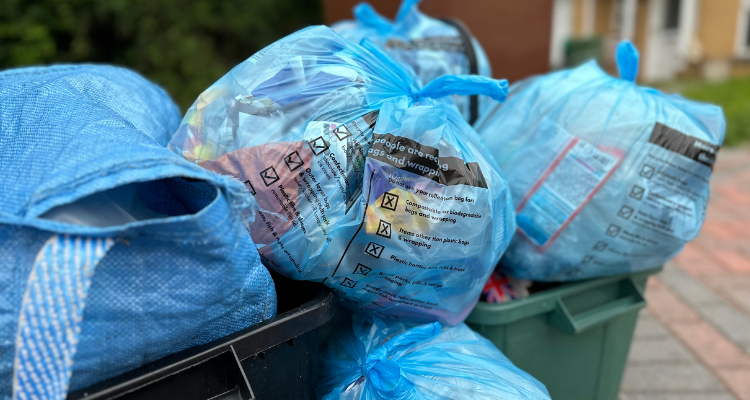
Encouraging proof of concept
Gareth Morton, Discovery Manager at Ecosurety and FPF representative commented: "These initial results are really positive and an encouraging proof of concept for further rollout and expansion of capacity.”
“We now need to run some of the pilots at scale to gather more data to properly investigate the longer term operational and financial impacts of collecting plastic bags and wrappings. We also need to do a lot more on reprocessing before the project ends in March 2025.”
“This year is going to be a really exciting one for the project with the planned pilot expansions and increasing the pace of reprocessing trials.”
Thomas Merry, Commercialisation & Innovations Manager at SUEZ recycling and Recovery UK commented “It’s been great to see households across all seven pilot authorities embrace the service with strong participation and low levels of contamination.”
“As we enter the second half of the project, we’ll bring more households into the trial to gain further insight on the impact of demographics on participation and the amount and type of material collected.”
“By the end of the project in spring 2025 we’ll have collected enough flexible plastics to explore different reprocessing options, providing valuable insights at each stage of the value chain.”
For full detail, download the FPF FlexCollect interim report on the Flexible Plastic Fund website.
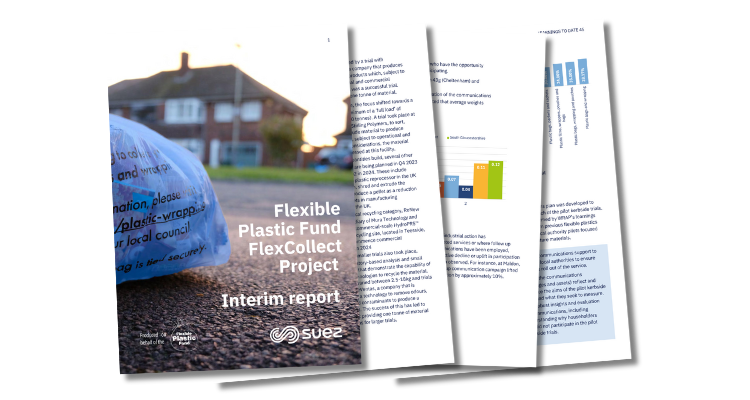
Join one of our webinars
The FPF FlexCollect project team is organising a series of webinars for the key stakeholders of flexible plastic recycling.
Speakers from Ecosurety, SUEZ, RECOUP and WRAP will present the key findings from the interim report and explore operational findings and compositional analysis of collected materials, to insight into household participation and reprocessing trials.
The sessions will also cover the next steps for the project and will give participants time to ask any questions at the end.
Webinar for the plastics and packaging industry, hosted by INCPEN – 8 February, 12:30pm – 1:30pm
Webinar for local authorities, hosted by LARAC - 19 February, 11am to 12:30pm
Webinar for the waste and resource industry, hosted by CIWM – 28 February, 12:30pm – 1:30pm
Webinar places can be booked here: FPF FlexCollect Interim Report — Flexible Plastic Fund.
About FPF FlexCollect
The FPF FlexCollect project is co-managed by a consortium comprising the project funders, Ecosurety, SUEZ recycling and recovery UK and WRAP.
This £3m project has been the main focus for the Flexible Plastic Fund (FPF) which is the majority funder, with other funding for the project coming from Defra, UK Research & Innovation’s Smart Sustainable Plastic Packaging (SSPP) Challenge delivered by Innovate UK and Zero Waste Scotland. The FPF is funded and supported by the following UK organisations: Abel & Cole, Ella’s Kitchen, Kiddylicious, Koninklijke Douwe Egberts, KP Snacks, Lotus Bakeries, Mars UK, McCain Foods, Mondelēz International, Natural Balance Foods, Nestlé, Ocado Retail, PepsiCo, pladis, The Collective, Unilever, and Vitaflo.
